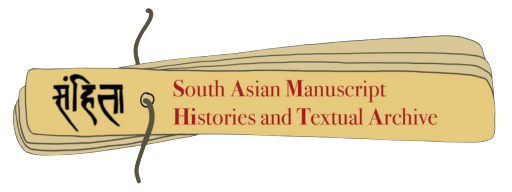Manuscripts
Search Filter
Mālatīmādhava
EAP1023/16/3 Language : Sanskrit Scripts : Devanagari
Malati Madhavam is a Sanskrit Drama of Bhavabhuti. It has ten acts. The love of Malati and Madhava is depicted in the drama.
Vedabhāṣya (Mādhyandinīya Paribhāṣāṅka)
EAP1023/16/1 Language : Sanskrit Scripts : Devanagari
Veda Bhasya is the commentary of Vedas. This manuscript contains 'Madhyandiniya Paribhasha'.
Sāṅkhyattvakaumudī
EAP1023/16/2 Language : Sanskrit Scripts : Devanagari
Sankhyatattva Kaumudi is a popular commentary of Samkhyakarika by Vācaspati Miśra (1450 - 1480 C.E.) of Mithilā.
Paňcavidhamātṛkānyāsa
EAP1023/17/14 Language : Sanskrit Scripts : Devanagari
Matrika-nyasais the installation of the Divine Mothers.Tantric works like Tantrarāja and Kulacūḍāmaṇi discuss the worship of Matrikas as Shaktis or lGarland of letters . A process of this worship is described in Devi Gita,a part of Devi Bhagavata Purana [Bhāgavatapurāṇa]. It involves installation of powers of Matrikas as Garland of letters in one's body by feeling the deity worshipped in different parts of the body. The Hrillekha-matrika-nyasa, a more specialized form of Matrika-nyasa, combines the installation of most powerful set of all letters (Matrikas) with the seed syllable Hrīṃ of Goddess Bhuvaneshvari.
Vedāntaparibhāṣā
EAP1023/17/13 Language : Sanskrit Scripts : Devanagari
Vedanta-Paribhasha is an epistemological work on Advaita Vedanta It is authored by Varadarajaaraja Dikshita. The author is believed to have lived in the seventeenth century. In this work he has adopted the method and phraseology of Navya-Nyaya, introduced by Gangesa Upadhyaya in the fourteenth century.
Hitopadeśa
EAP1023/17/15 Language : Sanskrit Scripts : Devanagari
Hitopadesha, lit. Beneficial Advice, is a Sanskrit text consisting of fables with both animal and human characters. It incorporates maxims, wisdom and advice on political affairs in simple, elegant language. It has been widely translated. The oldest manuscript found in Nepal is dated 14th century. Its content and style has been traced to the ancient Sanskrit treatises called 'Panchatantra'.
Vargacakra
EAP1023/17/12 Language : Sanskrit Scripts : Devanagari
This is an Indian astrological text. refers to the division of a zodiacal sign (rāśi) into parts. Each such fractional part of a sign called aṃśa has a source of influence associated with it. Those sources of influence come to be associated with collections of regions around the zodiac. There are sixteen vargas or divisional charts used in astrology They form the basis of a unique system of finding the auspiciousness or inauspiciousness of planets.
Nṛsiṃhapañjara
EAP1023/17/9 Language : Sanskrit Scripts : Devanagari
This is a Hindu Stora dedicated to the praise of Lakshmi Nrishimha.
Gṛhyasūtra
EAP1023/17/10 Language : Sanskrit Scripts : Devanagari
Grihya Sutra is a manual detailing the domestic religious ceremonies performed by both Hindu male and female householders over the fire. The Sutras, together with the Shrauta Sutras, which deal with the grand Vedic sacrifices, and the Dharma Sutras, which deal with rules of conduct, make up the Kalpa Sutras - collections of texts that emerged within the different Vedic schools. The Grihya Sutras describe the ceremonies that mark each stage of an individual’s life, from the moment of conception to the final death rites; the five daily sacrifices, seasonal ceremonies; and those observed on special occasions, such as house building or cattle breeding.
Vālmīki Rāmāyaṇa Uttarakāṇḍa
EAP1023/17/8 Language : Sanskrit Scripts : Devanagari
Ramayana [Rāmāyaṇa] is a great epic of the Hindus that elaborates the deeds of Rama an incarnation of Vishnu. He secured victory over evil. This manuscript is an abridged version of latter part of thestory detailing the story of Rama banishing Sita from Ayodhya and birth of their sons. It also elaborates the story of Luv Kush training by Rishi Valmiki.
Nirṇayasindhu
EAP1023/17/7 Language : Sanskrit Scripts : Devanagari
This is the book of decisions regarding to four Varnas, four Ashramas, Hindu religious and cultural behaviours, and all other activities.
Prāyaścittenduśekhara
EAP1023/17/6 Language : Sanskrit Scripts : Devanagari
It is a Dharmashastra text. Its subject is performance of prayaschitta or ritual atonement.













